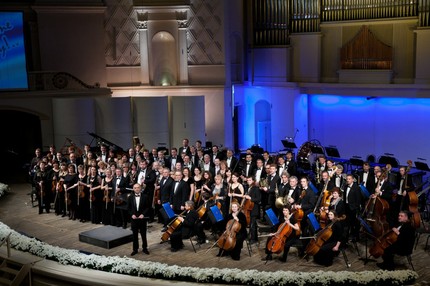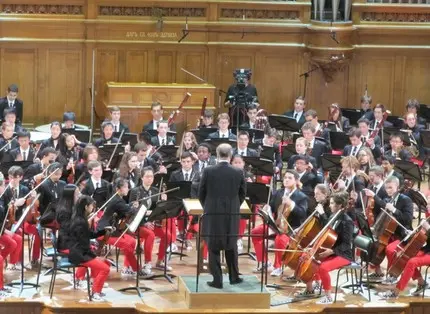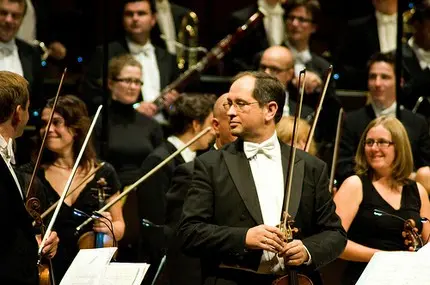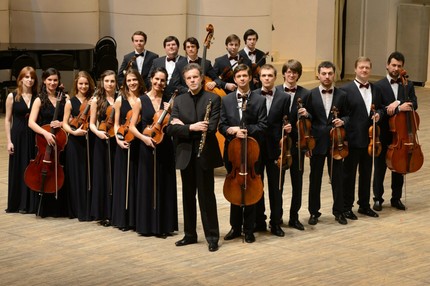
Russian State Symphony Orchestra of Cinematography |
Russian State Symphony Orchestra of Cinematography

The Russian State Symphony Orchestra of Cinematography traces its history back to the Great Mute. One day, in November 1924, in the famous Moscow cinema “Ars” on the Arbat, the place in front of the screen was taken not by a pianist-tapper, but by an orchestra. Such musical accompaniment of films was a success with the audience, and soon the orchestra, led by the composer and conductor D. Blok, began to play at screenings in other cinemas. From now on and forever the fate of this team was connected with the cinema.
The Cinematography Orchestra contributed to the creation of the best films of the pre-war period by the outstanding directors S. Eisenstein, V. Pudovkin, G. Aleksandrov, G. Kozintsev, I. Pyryev. Music for them was written by D. Shostakovich, I. Dunaevsky, T. Khrennikov, S. Prokofiev.
“Each past year of my life is associated with some work for the cinema. I have always enjoyed doing these things. Life has shown that Soviet cinematography found the principles of the most expressive, truthful combination of sound and visual elements. But every time the creative search for these compounds is so interesting and useful that the tasks remain inexhaustible, and the possibilities are endless, as it should be in real art. From my own experience, I was convinced that work in cinema is a huge field of activity for a composer and that it brings him invaluable benefits,” said Dmitri Shostakovich, a huge part of whose creative heritage is film music. He created 36 scores for films – from “New Babylon” (1928, the first Russian film for which music was specially written) to “King Lear” (1970), – and work with the Russian State Symphony Orchestra of Cinematography is a separate chapter of the composer’s biography . In the year of the 100th anniversary of the birth of Shostakovich, the orchestra took part in a festival dedicated to the memory of the composer.
The genre of cinema opens up new horizons for composers, freeing them from the closed space of the stage and unusually expanding the flight of creative thought. A special “montage” thinking allows revealing the melodic gift, removing the obligatory conventions of operatic and symphonic dramaturgy. That is why all outstanding domestic composers worked in the field of film music, leaving the best memories of joint work with the Cinematography Orchestra.
Andrey Eshpay: “Many years of joint work connect me with the wonderful team of the Russian State Symphony Orchestra of Cinematography. Our musical cooperation in recording studios and on concert venues has always led to full-fledged artistic results and made it possible to judge the orchestra as a high-class team with great potential, mobility, flexibility, sensitivity to the wishes of the composer and director. In other words, this is a one-of-a-kind collective, it has long, in my opinion, become a kind of academy of film music.
Edison Denisov: “I had to work with the Orchestra of Cinematography for many years, and each meeting was a joy for me: I saw again familiar faces, many musicians with whom I worked outside the orchestra. The work with the orchestra has always been highly professional both in terms of music and the accuracy of working with the screen.
All significant milestones in the history of Russian cinema are also creative achievements of the Cinematography Orchestra. Here are just a few of them: recording music for films marked by the prestigious Oscar – War and Peace, Dersu Uzala, Moscow Does Not Believe in Tears, Burnt by the Sun.
Work in the cinema makes special demands on the musical group. The recording of the music for the film takes place under strict time limits with almost no rehearsals. This work requires high professional skills of each orchestra artist, clarity and composure, musical sensitivity and a quick understanding of the composer’s intention. All these qualities are fully possessed by the Symphony Orchestra of Cinematography, which has always included the best musicians of the country, laureates of international competitions. There are almost no impossible tasks for this team. Today it is one of the most mobile orchestras, capable of playing in any large and small ensembles, transforming into a pop and jazz ensemble, performing in philharmonic concerts with a variety of programs, and at the same time constantly working in the studio, recording clearly timed music for films. Musicians are valued for this versatility, the highest professionalism and the ability to realize any idea of the composer and director.
From the memoirs of Andrei Petrov: “A lot connects me with the Russian State Cinematography Orchestra. With the wonderful musicians of this group, I recorded music for many films by our leading directors (G. Danelia, E. Ryazanov, R. Bykov, D. Khrabrovitsky, etc.). In this collective there are, as it were, several different orchestras: a full-blooded symphony composition easily transforms into a variety one, into an ensemble of virtuoso soloists, can perform both jazz and chamber music. Therefore, we constantly meet with this team not only in the credits of films and television films, but also on posters of concert halls.
Edward Artemiev: “Since 1963 I have been working with the Cinematography Orchestra and I can say that my entire creative life is connected with this collective. More than 140 films have been dubbed by the Orchestra of Cinematography with me. It was music of completely different styles and genres: from symphonic to rock music. And it has always been a professional performance. I would like to wish the team and its artistic director S. Skrypka long life and great creative success. Moreover, this is a one-of-a-kind team that combines both concert activity and film work.
All well-known composers willingly cooperated with the Russian State Symphony Orchestra of Cinematography – G. Sviridov and E. Denisov, A. Schnittke and A. Petrov, R. Shchedrin, A. Eshpay, G. Kancheli, E. Artemyev, G. Gladkov, V. Dashkevich, E. Doga and others. The success of the collective, its creative face was determined in contact with many talented musicians and conductors who worked with him. Over the years, D. Blok, A. Gauk and V. Nebolsin, M. Ermler and V. Dudarova, G. Hamburg and A. Roitman, E. Khachaturyan and Yu. Nikolaevsky, V. Vasiliev and M. Nersesyan , D. Shtilman, K. Krimets and N. Sokolov. Such well-known masters of musical art as E. Svetlanov, D. Oistrakh, E. Gilels, M. Rostropovich, G. Rozhdestvensky, M. Pletnev and D. Hvorostovsky collaborated with him.
Among the latest works of the film orchestra are the music for the films “Atonement” (director A. Proshkin Sr., composer E. Artemyev), “Vysotsky. Thank you for being alive” (director P. Buslov, composer R. Muratov), “Stories” (director M. Segal, composer A. Petras), “Weekend” (director S. Govorukhin, composer A. Vasiliev), “ Legend No. 17 (director N. Lebedev, composer E. Artemiev), Gagarin. The First in Space” (director P. Parkhomenko, composer J. Kallis), for the cartoon “Ku. Kin-dza-dza (directed by G. Danelia, composer G. Kancheli), to the TV series Dostoevsky (directed by V. Khotinenko, composer A. Aigi), Split (directed by N. Dostal, composer V. Martynov) , “Life and Fate” (director S. Ursulyak, composer V. Tonkovidov) – the last tape was awarded a special prize of the Council of the Academy “Nika” “For creative achievements in the art of television cinema.” In 2012, the national film award “Nika” for the best music was awarded to the film “Horde” (director A. Proshkin Jr., composer A. Aigi). The orchestra is actively invited to cooperate with leading Russian and foreign film studios: in 2012, the music for the film “Moscow 2017” (director J. Bradshaw, composer E. Artemyev) was recorded for Hollywood.
“The remarkable Cinematography Orchestra is a living chronicle of our art. Many roads have been traveled together. I am sure that many more wonderful musical pages will be written by the brilliant team into future cinema masterpieces,” these words belong to the outstanding director Eldar Ryazanov.
Concerts play an important role in the life of the band. His repertoire includes numerous works of Russian and foreign classics, music by contemporary composers. The Cinematography Orchestra regularly performs in subscription cycles of the Moscow Philharmonic with interesting programs designed for both adults and young listeners; is a welcome participant in major cultural projects, such as a concert on Red Square in honor of the 60th anniversary of Victory in the Great Patriotic War on May 9, 2005.
In the 2006/07 season, for the first time, the ensemble presented a personal philharmonic subscription “Live Music of the Screen” on the stage of the P.I. The first concert of the subscription was dedicated to the film music of Dmitri Shostakovich. Then, within the framework of the cycle, author’s evenings of Isaac Schwartz, Eduard Artemyev, Gennady Gladkov, Kirill Molchanov, Nikita Bogoslovsky, Tikhon Khrennikov, Evgeny Ptichkin, Isaak and Maxim Dunayevsky, Alexander Zatsepin, Alexei Rybnikov, as well as a concert in memory of Andrei Petrov were held. These evenings, loved by the public from young to old, brought together on the philharmonic stage the largest figures of Russian culture, directors, actors, including such masters as Alisa Freindlich, Eldar Ryazanov, Pyotr Todorovsky, Sergei Solovyov, Tatyana Samoilova, Irina Skobtseva, Alexander Mikhailov, Elena Sanaeva, Nikita Mikhalkov, Dmitry Kharatyan, Nonna Grishaeva, Dmitry Pevtsov and many others. The dynamic form of performances captivates the audience with a combination of music and video, high emotional tone and professionalism of performance, as well as the opportunity to meet with your favorite movie characters and directors, hear memories of the legends of domestic and world cinema.
Gia Cancelli: “I have almost half a century of friendship with the Russian State Symphony Orchestra of Cinematography, which is celebrating its 90th anniversary. Our warm relations began with Georgy Danelia’s film Don’t Cry, and they continue to this day. I am ready to bow to each musician individually for the patience they show during the recording. I wish the wonderful orchestra further prosperity, and to you, dear Sergey Ivanovich, thank you and my deep bow!”
For almost 20 years, the Symphony Orchestra of Cinematography has been performing in the Philharmonic subscription of the outstanding lecturer and musicologist Svetlana Vinogradova in the Great Hall of the Conservatory and the Tchaikovsky Concert Hall.
The Cinematography Orchestra is an indispensable participant of various music festivals. Among them are “December Evenings”, “Music of Friends”, “Moscow Autumn”, in whose concerts the orchestra has been presenting premieres of works by living composers for many years now, “Slavianski Bazaar” in Vitebsk, the Festival of Russian Culture in India, concerts within the framework of the Year Cinema of the Cultural Olympiad “Sochi 2014”.
In the spring of 2010 and 2011, the team made a successful tour with the Slovenian singer Mancea Izmailova – first in Ljubljana (Slovenia), and a year later – in Belgrade (Serbia). The same program was presented in the spring of 2012 at the Tchaikovsky Concert Hall as part of the Days of Slavic Literature and Culture.
At the beginning of 2013, the Cinematography Orchestra was awarded the Russian Government Grant.
The art of the Cinematography Orchestra is widely represented in numerous recordings of film music, which today is a classic of the XNUMXth century, and was once first performed by this ensemble.
Tikhon Khrennikov: “All my life I have been associated with the Orchestra of Cinematography. During this time, several leaders have changed there. Each of them had their own personality and characteristics. The orchestra at all times was distinguished by a magnificent composition of musicians. The current leader of the orchestra is Sergei Ivanovich Skrypka, a bright musician, conductor, quickly orienting himself in new music. Our meetings with the orchestra and with it have always left me with the impression of a holiday, and apart from gratitude and admiration, I have no other words.
Source: Moscow Philharmonic website





